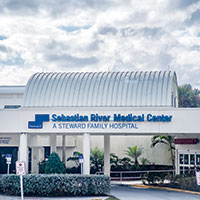 First 2 Steward hospitals fetch little at auction
First 2 Steward hospitals fetch little at auction
STORY BY PIETER VANBENNEKOM (Week of August 1, 2024)
The first two hospitals of the bankrupt Steward Health Systems chain have been sold at auction for a mere pittance, and Steward is closing two other hospitals it was trying to auction in Massachusetts for lack of any bidders.
But those disappointing results don’t necessarily mean that Steward’s Sebastian River Medical Center, also up for sale later this month, won’t fetch a more reasonable price from a buyer seeking to keep it open as a prime healthcare facility.
In the auction sale of Steward’s so-called “first round” of its 31 hospitals, excluding those in Florida and in northern Massachusetts, only Wadley Regional Medical Center in Hope, Arkansas (the hometown of former President Bill Clinton), and Glenwood Regional Medical Center in Monroe, Louisiana, found willing buyers.
The Arkansas hospital was sold for a mere $200,000 to Pafford Health Systems, Inc., a local Arkansas company with other operations in Louisiana, Mississippi, Oklahoma and the U.S. Virgin Islands, and the Louisiana institution went for $500,000 to an affiliate of California-based American Healthcare Systems known as AHS South.
While the buying and selling parties will also make each other whole for any working capital involved in the transaction, and the buyers may also assume certain liabilities of these hospitals, the amounts aren’t even a drop in the bucket when it comes to raising enough money to pay off Steward’s $9 billion in debts listed in the May bankruptcy filing.
At the same time, Steward said it had not received “bids that constitute a qualified bid” for its two hospitals in Ohio and one in Pennsylvania. Those three hospitals were taken off the list of assets to be sold and the company said it is working with consultants “to evaluate alternative ways to deal with” those facilities. Closures cannot be ruled out.
That left the other hospitals from the first round of sales, in southern Massachusetts, Texas and Arizona, still in limbo for now. The auction for those properties was supposed to have closed July 27 but was postponed to allow more time to receive acceptable bids, as Steward so far has failed to generate much excitement for a competitive bidding process in bankruptcy auctions for its hospitals.
Also included in the first round of sales was Stewardship Health, the Steward subsidiary that owns medical practices around its hospitals, including several primary care and specialist facilities in and around Sebastian, but that sale was postponed earlier when the company said it had received multiple expression of interest from several parties that needed more time to prepare bids.
Steward’s reportedly more desirable assets, five hospitals in northern Massachusetts a well as eight institutions in Florida, including the Sebastian facility and two others along the nearby Space Coast, have been left for the second round of the bankruptcy court auction, which is supposed to close on Aug. 22 in the federal bankruptcy court for the Southern District of Texas in Houston.
Since most other deadlines for the bankruptcy auction process have been pushed back for a variety of reasons, it’s not out of the question that this deadline may be pushed back as well, but there is some urgency in the matter. At some point Steward will run out of money again to meet payrolls. It is operating from interim financing provided in the form of secured loans, starting with a $75 million loan from its landlord, Medical Properties Trust (MPT) supplemented by another $225 million from a group of five commercial lenders.
No names of potential buyers for the Sebastian hospital have publicly surfaced, but behind the scenes, some jockeying for favorable bidding positions is believed to be ongoing.
“Something’s going on, but no one’s talking,” said one healthcare executive from the Space Coast.
Meanwhile, Steward is facing increasing government scrutiny on two continents. The Senate Health Committee is trying to subpoena Steward CEO Dr. Ralph de la Torre to explain at a public hearing why he was able to afford a $40 million yacht and how he and several other Steward executives drew down million-dollar compensation packages while vendors went unpaid.
The business news wire Bloomberg has called the Steward case a “portrait of corporate greed” that gives big business a bad name with the American public.
Also, on the Mediterranean island nation of Malta, there were demonstrations by angry people asking the government why it had given Steward 400 million Euros (more than $400 million) to run the tiny country’s three public hospitals in a government/business partnership that has since fallen apart.



